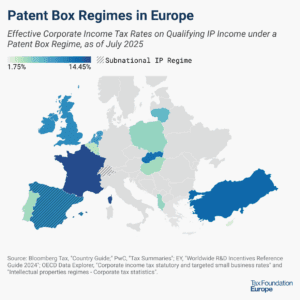
Simplifying Germany’s Income Tax System: A Path Toward Fairness and Efficiency
7 min readBy: , ,Germany’s income taxA tax is a mandatory payment or charge collected by local, state, and national governments from individuals or businesses to cover the costs of general government services, goods, and activities. system is complex. While many Scandinavians get mailed comprehensive pre-filled tax returns and only have to check whether they are correct, the average German taxpayer spends 9 to 10 hours and over €100 filing their tax return. Even though most taxpayers in Germany only have wage income, the main source of complexity lies in the numerous deductions offered by the German income tax code.
In Germany, you can (in principle) deduct all work-related costs from the income tax baseThe tax base is the total amount of income, property, assets, consumption, transactions, or other economic activity subject to taxation by a tax authority. A narrow tax base is non-neutral and inefficient. A broad tax base reduces tax administration costs and allows more revenue to be raised at lower rates. . This ranges from the cost of work-related materials like laptops or stationery (even if they are partly used for private purposes) to the cost of commuting to work or even of keeping a second apartment near your workplace for long-distance commuters. This requires Germans to collect receipts; as each train or parking ticket, work-related lunch, or even pen is deductible, one needs to keep the receipts to be able to deduct the costs from one’s tax return. While taxpayers can choose between this type of itemizing and a standardized deduction option, itemizing is very common. Tax authorities then have the burdensome task of checking millions of tax returns where such items are filed.
The extent of Germany’s deductions makes it an outlier in this regard. For example, countries like the United States and the United Kingdom have significantly more restricted systems. In the US, deductions are typically confined to expenses that exceed a high threshold. In the UK, deductions for employees are almost non-existent; costs must be wholly, exclusively, and necessarily incurred for the job to qualify. Most other countries also do not allow deductions for the costs of commutes to work, a home office, work materials, professional memberships and union fees, a bank account, or job application materials like photos or CV printing. Tax returns are easier to fill in, and no receipts need to be kept.
Do Germany’s deductions make its tax system more efficient by changing taxpayer behavior and inducing socially desirable outcomes? Unlikely—at least for most deductions. Efficiency effects tend to be fuzzy, and empirical evidence suggests that behavioral responses are most likely small. Recent research, for example, shows that making commuting costs tax-deductible has positive but relatively minor effects on taxpayer earnings and job quality. Moreover, any potential positive effect may be counteracted by efficiency costs from increased congestion or environmental externalities that go beyond tax policy.
Perhaps these deductions make the German tax system fairer? This could be the case if all taxpayers claimed the deductions they were entitled to. But many—especially those with low incomes—do not claim their deductions: for example, 70 percent of taxpayers with an annual income of €20.000 in 2014 did not file a tax return, and more than half of those not filing overpaid their taxes as a result—by €360 per person. In total, the German government saves about a billion euros a year because people do not file a tax return and thus overpay their taxes. Most of these are low-income individuals.
When deductions are claimed, they are claimed disproportionally by the well-off. Commuting costs, for example, rise almost linearly with income. Individuals at the 20th percentile of the income distribution claim on average about €250 of this deduction per year; individuals at the 80th percentile around €850. The deduction for having a second home close to work is distributed even more extremely. When Germany’s extensive deduction possibilities are taken into account, the German income tax system appears much less progressive than its tax rate schedule would lead one to believe.
A further major issue is that complex rules create loopholes. For instance, inflated claims for commuting expenses or home office deductions can often go unchecked, as tax authorities struggle to verify every detail (e.g., how many days a taxpayer commutes to work). When deductions are abused and richer individuals can game the tax system, trust gets eroded.
To address these challenges, we propose a bold but balanced simplification of Germany’s deduction rules for workers. The core idea is to replace the myriad of specific deductions with a standardized, workday-based deduction. This would significantly simplify tax compliance for individuals and reduce administrative burdens for tax authorities. In particular, we propose:
- Introducing a workday-based deduction
- Workers can claim a flat deduction of €7 per workday, translating to an annual deduction of €1.540 for workers with 220 annual working days. Basing the standard deductionThe standard deduction reduces a taxpayer’s taxable income by a set amount determined by the government. Taxpayers who take the standard deduction cannot also itemize their deductions; it serves as an alternative. on workdays takes into account that costs arise only when working. If someone works only for half the year, one would expect fewer work-related costs. The current standardized deduction for work-related items (‘Werbungskostenpauschbetrag’) is abolished.
- Eliminating most specific deductions
- Deductions for double households, commutes, home offices, work-related materials, and meal allowances, etc. are abolished. These costs are covered by the workday-based deduction. Expenses for work-related materials are absorbed by employers, who would retain the ability to deduct them as business expenses (and are legally obliged to cover these costs).
- Retaining deductions that set incentives
- The only itemized work-related deductions to keep would be deductions for education costs, as they incentivize obtaining additional skills.
This approach yields multiple advantages. Simplifying deductions removes one of the largest barriers to digitizing the tax process. With our suggestion, tax returns can be easily pre-filled through the already existing information exchange between employers and tax authorities.
Pre-filled tax returns could become the norm, saving millions of taxpayers significant time and effort when filing their tax returns. Tax authorities would need to spend less on verification and enforcement, freeing up resources for other priorities—like fighting tax evasion and avoidance. Thus, simplification can help foster trust in the tax system.
Replacing specific deductions with a standardized approach reduces the advantage enjoyed by those with higher incomes and access to tax advisors. Some might argue that removing deductions penalizes those who genuinely incur higher costs. However, employers are already mandated to cover most work-related costs (e.g., for work-related equipment) directly. This mandate could be extended, for example, to cover additional costs for meals when working outside of the home or workplace. The proposed reform shifts tax deductions from individual taxpayers to firms, whose tax departments are generally better equipped to administer them. Tax authorities would benefit from interacting with fewer (and better informed) taxpayers, and enforcement costs would plausibly decline as misreporting incentives decrease—reflecting that firms have muted incentives to pay for private consumption of their employees (e.g., laptops or tablets) and then falsely claim business-related tax deductions. All this renders the income tax more efficient and equitable.
At the same time, we also acknowledge that our suggestions come with challenges too. First, given the nature of standardized deduction frameworks, not all taxpayers would gain; some may lose deduction options and face an increased effective income tax burden. These losses may, to some extent, be buffered by coupling the reform with adjustments in the statutory tax rate schedule. Second, one may worry about conceptual and practical frictions, when expense items are treated differently for dependent workers and the self-employed. We believe that these systems can be integrated and can co-exist. In some domains, deduction options should, for consistency reasons and to reduce the scope for tax arbitrage, be abolished symmetrically for both dependent workers and the self-employed. An example is the granting of tax deductions for double households. In other domains, such as expenses for work material, costs need to remain tax deductible for the self-employed (contrary to dependent workers, the self-employed cannot shift the deduction to an employer). Moreover, while simplification options are, of course, also desirable when taxing the self-employed, the German tax system already has options in place; for example, certain occupations can deduct a lump sum of 30 percent of their revenues as expenses.
Germany’s income tax system is long overdue for reform. By simplifying deduction rules and introducing a standardized workday-based deduction, the government can reduce complexity, promote fairness, and enhance trust in the tax system. This approach is not only administratively sound but also a step toward a more equitable tax policy—one that truly serves all taxpayers, not just a few well-advised individuals.
Note: This blog post is part of a series focused on the impacts of tax policy and the 2025 German federal election. See more here, here, and here.
Stay informed on the tax policies impacting you.
Subscribe to get insights from our trusted experts delivered straight to your inbox.
Subscribe




